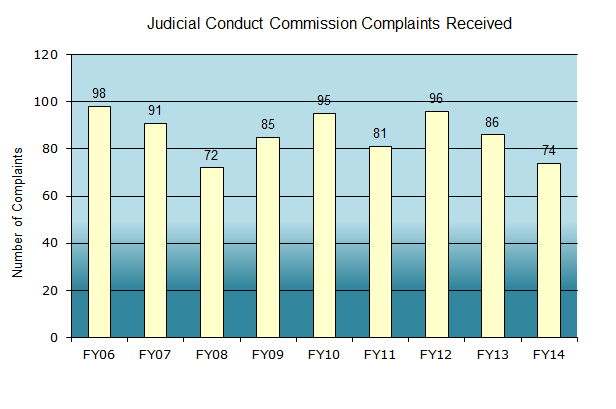The Judicial Conduct Commission is a quasi-independent agency that investigates and resolves complaints against Utah judges. The executive director manages claims, assigns investigators, and prosecutes judges when necessary. The commission dismisses approximately ninety percent of all complaints, resolves five percent by stipulation, and conducts formal hearings for five percent of all complaints.
During the 2015 General Session, the Legislature appropriated for Fiscal Year 2016, $251,800 from all sources for Judicial Conduct Commission. This is a 6.4 percent reduction from Fiscal Year 2015 revised estimated amounts from all sources. The total includes $251,800 from the General/Education Funds, an increase of 2.3 percent from revised Fiscal Year 2015 estimates.
In addition to statewide compensation and internal service fund cost increases, the following appropriation adjustments were made during the 2015 General Session:
Judicial Conduct Commission Complaints Received
The commission strives to promote public confidence in the judicial system and create greater awareness of proper judicial conduct. The following chart shows the number of complaints received and investigated by the commission. Note that the Governor's Office of Management and Budget is currently revamping the performance measures for Administrative Services.

A constitutional amendment passed in 1984 established the Commission as part of Article VIII, Section 13 of the Utah Constitution. Following investigations and hearings, if the commission finds cause as outlined in Section 13, it may recommend that the Supreme Court reprimand, censure, suspend, remove, or involuntarily retire any justice or judge.
Commission composition is defined in UCA 78A-11-103 as:
- Two members from the House of Representatives
- Two members of the Senate
- Two members of the Utah State Bar
- Three non-members of the Bar, appointed by the governor with consent of the Senate
- Two judges appointed by a majority of the Utah Supreme Court
Current expense in this budget is used to hire outside investigators and temporary employees based on case load.
COBI contains unaudited data as presented to the Legislature by state agencies at the time of publication. For audited financial data see the State of Utah's Comprehensive Annual Financial Reports.